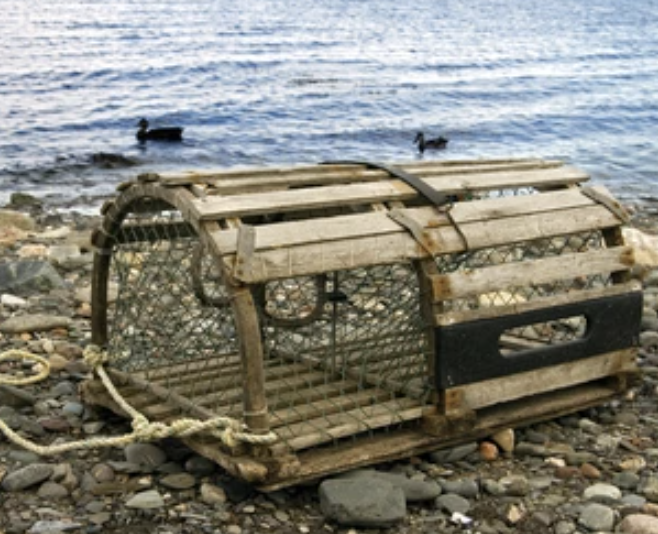
Norwalk, CT – The Lobster Trap Recovery and Assessment Partnership (L-TRAP) is celebrating the removal of 1,178 abandoned lobster traps from Connecticut waters of Long Island Sound that were lost over decades of fishing.
The L-TRAP project is a collaborative conservation effort between The Maritime Aquarium, Save the Sound, Project Oceanology, Cornell Cooperative Extension of Suffolk County, Remote Ecologist and local fishers to improve the ecosystem. So far, the partners have completed 57 of 95 federally funded trips to do this work.
Traps that are left to sit at the bottom of the Sound continue to attract lobsters, crabs, and fish. These creatures either die from being unable to escape or attract other larger predators, which leads to further declines in populations. The traps can also disrupt bottom habitats, especially during storm events; interfere with navigation and the work of remaining members of the fishery; and leach potentially harmful chemicals into the water as plastic coating on the gear breaks down.
The Maritime Aquarium Director of Conservation and Policy Dr. Sarah Crosby said: “We are delighted to be working alongside current and former members of the lobster fishery to accomplish this important work. We have found over 10,000 animals inside of these traps so far, both alive and dead, including fish, crabs, and even a few lobsters! We are learning so much about the Sound through this work, but also restoring the ecosystem in a really tangible way. There are lots of traps left to collect, but we have great momentum and amazing partners! We are excited to keep going.”
Save the Sound’s Long Island Soundkeeper Bill Lucey said: “We began this initiative for Connecticut in 2019, and it is great to see the program completing its first year. Working with the Connecticut fishing industry captains and crewmembers has been an invaluable learning experience. Each fishery is unique, and their advice on how to accomplish this cleanup has greatly enhanced our efficiency. When fisheries managers, harvesters and ecologists work together the entire Sound benefits.”
Project Oceanology Marine Science Educator Amy Stockburger said: “As an organization focused primarily on environmental education and outreach we're excited to contribute to this conservation effort because it not only benefits our local environment but also inspires our students to take action in their own communities. It's been a rewarding experience to work with a variety of industry partners and we look forward to the next 1,000 traps and the discoveries that come with it!”
Executive Director of Cornell Cooperative Extension of Suffolk County Vanessa Lockel said:“This project underscores our organization's dedication to environmental stewardship and fostering positive, long-term changes for the Sound's health through collaboration with other organizations and the fishing industry. The array of ecological and financial benefits is truly significant, and CCE Suffolk is immensely proud to be a part of L-TRAP and its valued partnerships.”
Remote Ecologist Founder and Research Scientist Dr. David Hudson said: “Having researched crustaceans my whole career, it is incredibly important to work with the members of fisheries and aquaculture operations in Long Island Sound to prioritize conservation actions that will ensure a healthy estuary and improve the outcomes for the ecological community. We are learning important insights not only about the biological impact of these traps and how the Sound has changed over the past couple decades, but also of the historical uses of these spaces by coastal communities.”
Commissioner of the Connecticut Department of Energy and Environmental Protection Katie Dykes said: “We are thrilled that the cooperative effort to remove ghost fishing gear from Long Island Sound has achieved this notable milestone. We appreciate the effort of all the project partners in bringing to fruition the promise of the 2018 Public Act which created the ability for DEEP to authorize third parties to remove lost fishing gear from the Sound. The L-TRAP partnership is a great example of how various stakeholders can work with regulators to collaboratively deliver positive outcomes for the Long Island Sound ecosystem. We look forward to continuing to support the partnership’s important work.”
For more information about this project or to learn how to get involved, emaillobsters@maritimeaquarium.org.
THE MARITIME AQUARIUM AT NORWALK inspires people of all ages to appreciate and protect the Long Island Sound ecosystem and the global environment through living exhibits, marine science and environmental education. The aquarium is home to over 7,000 animals of hundreds of species including seals, sharks, rays, jellies, turtles and meerkats. Additionally, it offers sensory-enhanced 4D movies, in-person and virtual education programs for schools and families, and public cruises aboard its hybrid-electric research vessel. The Maritime Aquarium is an accredited member of the Association of Zoos & Aquariums, and receives support from the State of Connecticut DECD’s Offices of Culture and Tourism. For more information, visit www.maritimeaquarium.org.